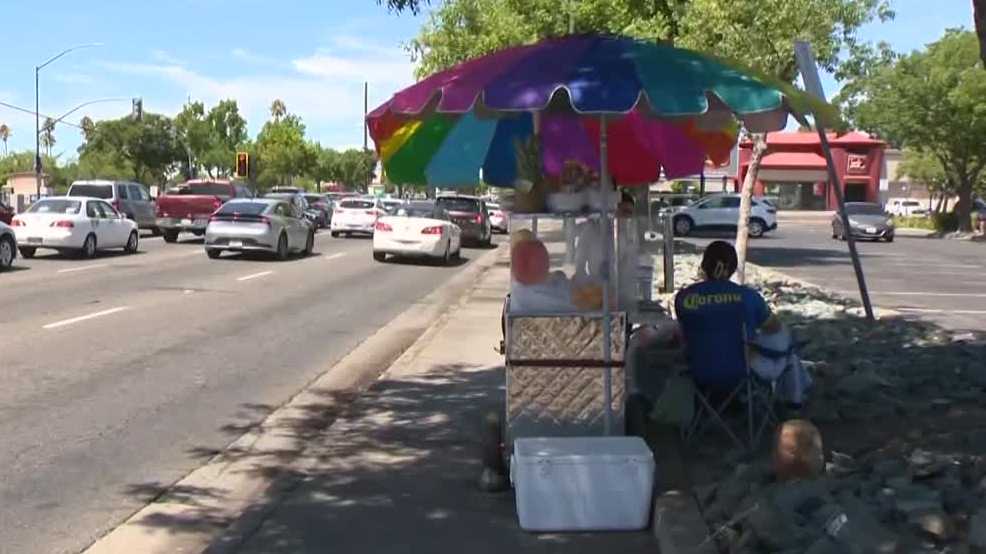A new California law, Senate Bill 635, the Street Vendor Protection Act, will protect street vendors by prohibiting local governments from sharing sensitive personal information collected during permitting processes with federal immigration agencies, unless there is a judicial subpoena.An anonymous street vendor expressed the fear many vendors experience, saying, “Sometimes we are scared, hiding, and we have to close up early if we see something suspicious.”Senator Maria Elena Durazo, who championed the bill, shared why she felt the law was so important. “With the aggressive, cruel way that the Trump Administration is sending ICE agents, we felt it was really important that they have some protection from the sensitive information that could be shared with the federal government,” Durazo said.”We don’t know what’s going to happen. We don’t know when we’re going to come out to and that’s the scary part. If we’re going to go back home to our kids, or are they just going to show up out of nowhere?” expressed the street vendor.Street vendors, many of whom are immigrant entrepreneurs, rely on daily sales to support their families. SB 635 offers them a layer of protection and peace of mind. One vendor expressed relief, saying, “A lot of immigrants won’t be scared anymore knowing that the government or the state is going to help us. Not giving our information out helps a lot, and we won’t be afraid to be out and selling and stuff.”In Sacramento, fears intensified earlier this year after a federal immigration raid at a Home Depot parking lot, a popular spot for day laborers and street vendors. “We were scared,” one vendor recalled. “We were thinking of not coming, but we still risk our lives coming out here to provide for our family.”The city of Sacramento and Sacramento County confirmed they do not ask about immigration status during the permitting process. A spokesperson with the county clarified that for sidewalk vendors, they ask for contact information for communication purposes and do not release personal data without a subpoena or court order.”They earn a living, an honest living,” Durazo said. “They work really hard and they provide this important part of our community.”SB 635 will take effect Jan. 1, 2026, requiring local jurisdictions to implement policies that comply with the new data protection standards.See more coverage of top California stories here | Download our app | Subscribe to our morning newsletter | Find us on YouTube here and subscribe to our channel
SACRAMENTO, Calif. —
A new California law, Senate Bill 635, the Street Vendor Protection Act, will protect street vendors by prohibiting local governments from sharing sensitive personal information collected during permitting processes with federal immigration agencies, unless there is a judicial subpoena.
An anonymous street vendor expressed the fear many vendors experience, saying, “Sometimes we are scared, hiding, and we have to close up early if we see something suspicious.”
Senator Maria Elena Durazo, who championed the bill, shared why she felt the law was so important.
“With the aggressive, cruel way that the Trump Administration is sending ICE agents, we felt it was really important that they have some protection from the sensitive information that could be shared with the federal government,” Durazo said.
“We don’t know what’s going to happen. We don’t know when we’re going to come out to and that’s the scary part. If we’re going to go back home to our kids, or are they just going to show up out of nowhere?” expressed the street vendor.
Street vendors, many of whom are immigrant entrepreneurs, rely on daily sales to support their families. SB 635 offers them a layer of protection and peace of mind.
One vendor expressed relief, saying, “A lot of immigrants won’t be scared anymore knowing that the government or the state is going to help us. Not giving our information out helps a lot, and we won’t be afraid to be out and selling and stuff.”
In Sacramento, fears intensified earlier this year after a federal immigration raid at a Home Depot parking lot, a popular spot for day laborers and street vendors.
“We were scared,” one vendor recalled. “We were thinking of not coming, but we still risk our lives coming out here to provide for our family.”
The city of Sacramento and Sacramento County confirmed they do not ask about immigration status during the permitting process. A spokesperson with the county clarified that for sidewalk vendors, they ask for contact information for communication purposes and do not release personal data without a subpoena or court order.
“They earn a living, an honest living,” Durazo said. “They work really hard and they provide this important part of our community.”
SB 635 will take effect Jan. 1, 2026, requiring local jurisdictions to implement policies that comply with the new data protection standards.
See more coverage of top California stories here | Download our app | Subscribe to our morning newsletter | Find us on YouTube here and subscribe to our channel

